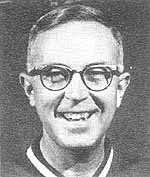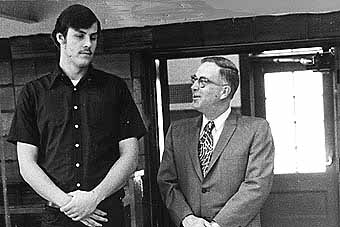
Maury John
MAURY JOHN
By RICK BROWN
Register Staff Writer
07/16/1995
When John John thinks of his father, Maury, there is one indelible memory.
"I remember many times at night he'd be sitting in his bedroom," John said. "He'd have a piece of scratch paper and a pencil in his hands, and he'd be diagramming."
|
Maybe it was a last-second play, or a throw-in against a press. It was something in the maze of basketball's Xs and Os that might lead his team to victory some day.
"That was him, that is what he loved to do," John John said. "He was always thinking ahead."
Today, the late Maury John becomes the 144th member of The Des Moines Sunday Register's Iowa Sports Hall of Fame.
Maurice E. John was a master tactician and salesman rolled into one. He had great self-confidence in his knowledge of the game of basketball. He also had the unique ability to convince his players that what he told them would work.
That combination took Drake's basketball program to incredible heights during his 13 seasons as coach.
The Bulldogs averaged 23 victories in John's final three seasons at the school, reaching the NCAA Final Four in 1969 and the Midwest Regional final in 1970 and 1971.
Under John, the school's winningest coach, Drake appeared on national television for the first time; played in a postseason tournament for the first time; won 20 games in a season for the first (and last) time; appeared in the top 10 of the Associated Press poll for the first time; and had the five winningest seasons in school history.
After taking Drake to its third consecutive NCAA appearance in 1971, John took over the Iowa State program. But he never got a chance to climb his ladder of success in Ames.
He died of cancer on Oct. 15, 1974, the day college practice started across the nation and 2 1/2 months after he had resigned his post because of his deteriorating condition. He was 55.
He left behind the love and admiration of his players.
"They say a Rolls Royce increases in value the older it gets," said Willie McCarter, the star guard on Drake's 1969 Final Four team. "That is what Coach John is to us. The more I look back, the more I realize how important he was to our lives."
If a player is indeed a reflection of his coach, Willie McCarter and Dale Teeter remain at the heart of John's coaching philosophy.
McCarter was from Gary, Ind., and attended all-black Roosevelt High School. Dale Teeter was from Whittemore, and attended all-white Algona High School.
"Dale had never been around any minorities," said McCarter, now living in Grand Rapids, Mich. "At Gary Roosevelt I never had a white teacher. I teased people that my high school was so black we didn't even have white toilet paper. Conversely, the same was true with Teeter.
"But Coach John took those two elements, brought us to Des Moines and molded us into one. When you see us together, it's like we were brothers born and raised together."
When the two were teammates at Drake, in the late 1960s, racial tensions were boiling over in many of the nation's metropolitan centers.
"But Coach John took racism out of the Drake vocabulary," McCarter said.
On Drake's 1968-69 team, the most famous in school history, McCarter and Teeter were again at opposite ends of the spectrum.
McCarter averaged a team-high 20.4 points for a team that would finish 26-5, lose to eventual national champion UCLA by three points in the semifinals and beat North Carolina by 20 points for third place. Teeter averaged just 1.1 points in 13 games.
"But Coach John made us all take a role," McCarter said. "He made everyone feel that without them, the wheel wouldn't go around. He made every spoke in the wheel as important as the other. That made you want to go out and bust your butt for him."
McCarter, Don Draper, Gary Zeller, Dolph Pulliam, Willie Wise, Al Williams, Garry Odom, Rick Wanamaker and Ron Gwin got a majority of the playing time on that Final Four team, but Teeter felt a part of all 26 victories.
"Dolph was captain of the defense," Teeter said. "Willie was captain of the offense. Al Williams was captain of the rebounding team. I was on the bench. My role was to be the cheerleader.
"When the game was over and we won, (John) went right down the group and complimented everyone. He's say to me, 'Dale, you did a heckuva job on the bench. He made us all feel like part of every win. But we also got our butts chewed if we lost."
When he filled out a faculty questionnaire in September of 1965, Maury John was asked to list his special interests.
He wrote two words with his ink pen: Basketball Defense.
John and sticky man-to-man defense will forever be linked. It became known as belly-button defense.
What was belly-button defense? John taught belly-up, face-to-face defense, with an emphasis on total ball denial, especially on the wing. He also stressed weakside help. He wanted to make it difficult for the opponent to get an offense started in a half-court set.
The epitome of belly-button defense was Pulliam, who always drew the opponents' best offensive player and often took him out of the game.
"The best story I can remember is the great Sam Williams at Iowa," Teeter said. "We were playing them in Des Moines. Dolph denied him to a point in the second half where Sam literally quit. He just walked the length of the floor and sat on the bench while the game was going on. Dolph followed him to the bench."
McCarter, who was Pulliam's high school teammate, remembers John's big sales pitch after their freshman season. Pulliam had averaged a team-high 18 points on the freshman team, while McCarter averaged 17.5.
But John convinced Pulliam that the team would benefit the most if Dolph became the defensive stopper and McCarter carried the scoring load.
"Dolph gave up his scoring to become the defensive king," McCarter said.
Get me to the final 2 minutes, John always told his team, and I'll outcoach the opposition. He did, more times than not.
In 1969, no one gave Drake a chance against Coach John Wooden's UCLA dynasty. Lew Alcindor (now Kareem Abdul-Jabbar), Sidney Wicks and Curtis Rowe were the Bruins' mainstays. Sports Illustrated suggested that Drake bring white flags of surrender with it.
But John convinced his players they could win.
"UCLA has a problem," Dan Callahan, then John's assistant, said as the Bulldogs went through a practice. "They don't know that Willie McCarter knows he's as good as Alcindor."
UCLA would edge Drake, 85-82, in what was later called the true national championship game. The Bruins beat Purdue by 20 points in the final.
"My mother always told me that God never gives you anything you can't handle," McCarter said. "That's what I thought about Coach John. He never gave us anything we couldn't handle. In that 1969 game against UCLA, for one special moment he had us all believing we were more than what we really were."
After the game, when asked what was the matter with UCLA, Wooden had a succinct response.
"Drake," Wooden said.
Drake played its final home game of the 1970-71 season against St. Louis on Feb. 27. That afternoon, John signed a contract to replace Glen Anderson as Iowa State coach.
Some members of the Bulldog family didn't think much of John's departure to their arch-rival.
"I'm sure some of the fans never understood the reasons why he left, or tolerated them," said Paul Morrison, who was Drake's sports information director and later business manager during John's reign. "This was a great opportunity for the guy to step up the ladder."
Hilton Coliseum - "an $8 million palace," John called it - was ready to open. John had grown tired of scheduling conflicts with Veterans Memorial Auditorium, and longed for a campus facility.
Iowa State was also offering more money than the $18,500 John was making at Drake, as well as a bigger recruiting budget.
One story goes that after the string of NCAA appearances, John went to Drake's brass and asked for a bigger recruiting budget to remain competitive.
When that failed, he told his bosses that he was looking at other jobs. That, too, was ignored until it was too late.
One of the people John talked to during the process was McCarter, who had signed with the Los Angeles Lakers in 1969 after being drafted in the first round.
"He probably called me eight or nine times," McCarter said. "I'll never forget the initial call. He said, 'How would you feel if I left Drake?' "
McCarter told his coach that his loyalty was to John first and Drake second.
"He said, 'I don't really want to go,' " McCarter said. "He said, 'Iowa State has offered such a package. If Drake comes even close to it I'll stay.' But Drake never did."
McCarter said Drake has failed to thank John properly. He once campaigned to have Drake Fieldhouse renamed in honor of John.
"I don't care if it's just a Maury John basket," McCarter said.
John inherited an Iowa State team that won five games the previous year and turned things around with records of 12-14 and then 16-10, the school's best record in 16 years.
In October 1973, with practice about to start, John was having trouble sleeping and went to see a doctor. Two months later, on the day his Iowa State team lost at Drake, John was told he had an inoperable malignant tumor at the base of his esophagus.
"It was a bolt out of the blue for someone who lived his life free of smoking or drinking," John John said. "There was high stress. But he was always healthy."
The game against Drake was the last one he ever coached.
After announcing his resignation at Iowa State, in July 1974, John was asked to reflect on his career. He called Drake's Final Four appearance in 1969 his biggest thrill as a coach.
"It's going to be hard for me not to be on that bench," John said. "I won't have to sweat out all those games down on the floor. But truthfully, I'd rather be down there sweating them out."
Teeter was a pallbearer at John's funeral.
"That was the greatest honor ever bestowed upon me," Teeter said. "It meant a lot to me. He had such an impact on my life."
Today, 25 years after he left Drake, McCarter still misses his coach.
"I'd give it all up if he could still be here," McCarter said. "Selfishly, I've needed to talk to him more than once." A scholarly fellow, in many ways, Maury John was also known for speaking his mind to referees, as he did in this 1970 game.
 Register File Photo |
| Seven-foot Tom O'Connor (left) talks with Maury John. |